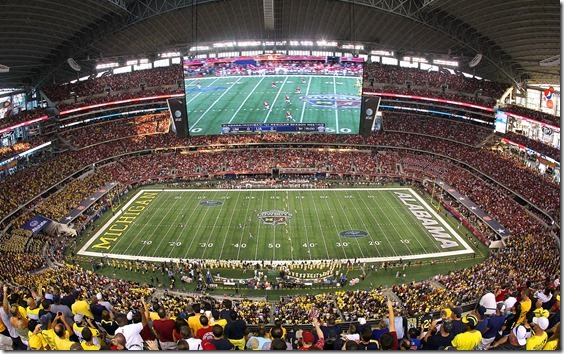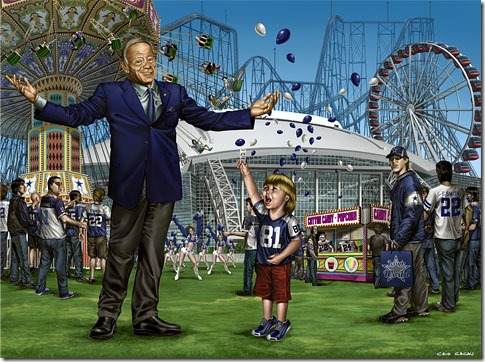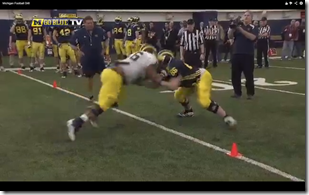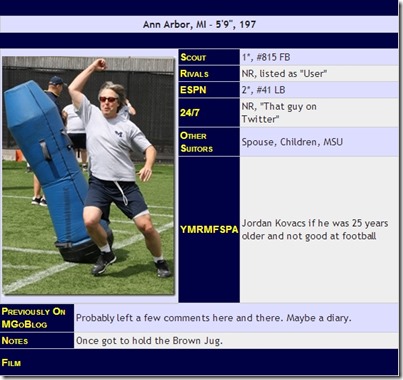2012 alabama
John Bacon's latest book Fourth and Long is a look at four Big Ten teams in various places as the 2012 season progresses: Penn State, Ohio State, Michigan, and Northwestern. While the Penn State stuff is unbelievably compelling, Bacon also touches on the increasing commercialization of the game—a hot button topic here—in multiple sections, including Michigan.
The following is an account of what went down during the Great Band Fiasco Of 2012. If you desire a look at the Northwestern and Ohio State sections, Sippin' On Purple and Eleven Warriors both have excerpts today.

Cowboy Stadium
On Friday morning, April 20, 2012, while I watched workers set up the stage for the groundbreaking ceremony for Penn State’s $104 million hockey arena the day before their football team’s spring game, I took my weekly call from Ann Arbor’s local sports-talk station, WTKA.
This being six days after Michigan’s spring scrimmage, I assumed the morning hosts would ask me how Michigan’s second-year coaches, who favored a pro-set offense, were meshing with soon-to-be senior Denard Robinson, the consummate spread-offense quarterback. So I was a little surprised when Ira Weintraub and Sam Webb asked me about the Michigan-Alabama game, scheduled more than four months away, on September 1 in Dallas.
It was already being hyped as a clash between two tradition-rich programs, both ranked in the preseason Top 10, and two tradition-rich conferences. But it was bigger than that, because the schools had struck a deal with the Dallas Cowboys’ celebrity owner, Jerry Jones, to play the game in his shiny, new, $1.15 billion, state-of-the-art pleasure dome, nicknamed Jerry World.
They called the game the Cowboy Classic, a four-year-old version of the former Kickoff Classic, and it had come to represent the apotheosis— or nadir, depending on your view—of all that modern college football was becoming: the colossal, professional stadium; the seemingly endless corporate tie-ins; and the orgy of interest in a game between amateur athletes.
Although Michigan did not sell out its allotment of 17,500 tickets for the Sugar Bowl a couple months earlier, the athletic department had no trouble selling all 25,000 tickets for the Cowboy Classic, before they could even offer them to the general public. They were gobbled up entirely by Victors Club members: first to those with the most “priority points” (which they accumulate largely through donations), down to those with just one priority point. Thousands of fans with no priority points got shut out.
It was all the more impressive because the tickets for the Cowboy Classic weren’t cheap: $125 for a seat in the rafters and $285 for one on the 50, plus $80 for parking across the street. Jerry World also offered standing-room-only tickets, which one website packaged with vouchers for a beverage, a hot dog, and a bag of chips for $89—and sold more than twenty-three hundred of them.
“Let’s put it like this,” the ever-quotable Jerry Jones said the week of the game. “I’m going to compare it even to the Super Bowl. They’re two different events—but this is the hottest ticket . . . of any game or any event that we’ve had at that stadium.”
Michigan would net $4.7 million for the Cowboy Classic matchup with Alabama, the highest payout ever for a Kickoff Classic/Cowboy Classic season opener. After the department publicized that fact, fans were surprised to hear athletic director Dave Brandon announce he would not be sending the Michigan Marching Band to the game because the athletic department couldn’t afford the $400,000 travel expense. That decision lit up sports-talk shows across the state.
This seemingly simple decision to leave the band at home raised an equally simple question: How important is the marching band to the fans?
A few weeks before Brandon’s announcement, he sent band director Scott Boerma an RFP, or a “request for proposal,” which is how CEOs ask for a sales pitch. Brandon told Boerma to put together a page of bullet points explaining why Boerma thought it would be better for the band to fly to Dallas for the season opener against Alabama, on September 1.
“We did so,” Boerma told me, “and we turned it in. We never expected Brandon to fly us down, but we hoped. At that point, it was my assumption that we would have a conversation about those bullet points, most likely making compromises on both sides. But a few days later, we heard that the answer was simply no. And that was it.”
Ann Arbor Torch And Pitchfork
![Michigan-band-walks-onto-the-field-Jeffrey-McMahon[1] Michigan-band-walks-onto-the-field-Jeffrey-McMahon[1]](https://mgoblog.com/sites/mgoblog.com/files/images/Fourth-And-Long-The-Excerpt_A2C0/Michigan-band-walks-onto-the-field-Jeffrey-McMahon1.jpg)
Boerma and his band were stunned, but not as much as their loyal following, who blasted the decision through just about every medium available. For a week in late April, the band’s fate dominated Ann Arbor sports-talk radio—a first, to be sure. Invective aside, the callers’ main complaint was that if Brandon eliminated a home game or the possibility of an attractive home-and-home against Alabama for the chance to play in Jerry World primarily for the record paycheck, as he stated, then why couldn’t Michigan afford the $400,000 it would cost to take the marching band? After all, the band had to be one of the main attractions of college football Jerry Jones surely expected when he invited two college teams to play in his pleasure dome.
There seem to be a few reasons behind Brandon’s initial decision. A $4.7 million payday sounds like a lot, but according to MGoBlog’s Brian Cook, it was actually about $300,000 less than Michigan would have made if Brandon had scheduled Alabama for a home-and-home series, on the same terms Michigan had with Notre Dame. The deal looks even worse when you take into account the team’s travel costs to Dallas, and the substantial revenue from parking and concessions Michigan would have kept for a home game—not to mention the excitement such a game would generate among season-ticket holders from the day it was announced. Cook concludes, “This supposed financial windfall simply does not exist.” [Ed: the department would later cop to this fact.]
But if you looked at Brandon’s initial decision to leave the band behind purely from a short-term business perspective, it made sense. The band trip would cost real money, coming right off the bottom line, but would not necessarily influence the outcome or ticket sales or TV ratings. Fans would not wait in long lines to buy Michigan Marching Band uniforms—be they classic or “alternative”—and EA Sports was not champing at the bit to put Michigan’s drum major on the cover of its next marching-band video game.
![19072326[1] 19072326[1]](https://mgoblog.com/sites/mgoblog.com/files/images/Fourth-And-Long-The-Excerpt_A2C0/190723261.jpg)
from "Day 2 Marching Band Not Going To Dallas Rage Thread"
If you bring it back to the simple question of keeping your fans happy, however, Brandon’s decision was as foolhardy as the CEO of Cracker Jack eliminating the prizes at the bottom of the boxes because, hey, you can’t eat them, and those things cost money. If there is one symbol of college football that distinguishes the irrational, romantic notions fans feel for their favorite sport from the streamlined sensibilities of the pro game, the marching band might be the best place to start. When the band plays, the students feel connected to their parents, and their parents feel connected to their past, traveling back in time to their college days.
It is the prize at the bottom of the box.
Shortly after Bill Martin became athletic director in 2000, he commissioned a survey titled “Fans Speak Out on Game Day Experience,” by his good friend, Republican pollster Bob Teeter. The response rate alone told them how passionate Michigan fans were about their team. While most consumer surveys attract a 6 to 8 percent rate of return, fully 64 percent of the three thousand Michigan fans randomly selected responded—or about ten times the average.
When these season-ticket holders were asked to rank the importance of twenty-three aspects of the game-day experience, the survey readers weren’t too shocked to find seat location atop the list, with 88 percent of respondents ranking it “important.” But the marching band finished a close fourth, with 83 percent, two places ahead of the final score, and four ahead of the quality of the opponent. Thus, whether the Wolverines won or lost, or which team they were playing—in other words, the football game—was less important to the fans than seeing the marching band. After all, the band remained undefeated.
Brandon took some hits for his decision from fans, who flooded his e-mail account, but donors soon stepped up to cover half the $400,000 tab, leading some to believe the whole incident was a ruse to get someone else to pay the bill. But UM’s band director at the time, Scott Boerma, wasn’t buying it. “I do not think he planned on the backlash,” Boerma told me, “nor do I think it was some clever way to get donors to pony up for it. Dave was genuinely surprised.”
After Brandon finally capitulated, he told the Detroit Economic Club in August that it was all a “misunderstanding,” akin to a “family squabble.” He said he had agreed from the outset to fund the $100,000 necessary for the band to take buses down to Dallas, allowing them to play concerts along the way."
“The band changed their mind,” Brandon said. “They decided they didn’t want to be in buses and they didn’t want to play their way to Dallas, and they came and said, ‘We’re planning on coming to Dallas, everybody’s planning on coming to Dallas, but we’re not going to ride in buses—we’re going to fly in a jumbo jet and here’s what it’s going to cost.’”
But Boerma recalls the dialogue differently. “I think it’s important for people to know that we never ‘changed our mind.’ We never agreed to busing down and playing gigs along the way. We offered to look into that possibility, but when we did, we determined that it really wouldn’t be best for all concerned, especially because it would be the weekend before classes started, and we would lose several days of our pre-season rehearsals, when we prepare for the entire fall ahead. We never refused to bus down, as Brandon said. We were never given the opportunity to refuse anything, because there was no follow-up conversation.
“When it all hit the fan, I made sure that it wasn’t the band students and staff causing a commotion. We just laid low and waited for it all to work out. If the decision to not take the band down remained intact, we would have been fine with that. It was Brandon’s decision; he was paying the bills, and that’s his business.”
Of course, some fans angered over the decision included big donors, who ultimately stepped up to cover half the cost of the band’s trip.
"The band is coming to Dallas," Brandon told his audience. "And I hope you enjoy every note."
Leaving the band behind for a big game proved not to be an option—at least in 2012.
As the arms race escalates, Brandon does not seem terribly interested in slowing down to ponder it all. He is too busy pressing full steam ahead. “I don’t talk the past,” he said several times in his first year as Michigan’s athletic director. “I create the future.”
He might just be right.
If the future of Penn State was in the hands of its players, and Ohio State in the hands of its new head coach, Michigan’s was in the hands of its new athletic director.
Fourth and Long is available everywhere: 11 bucks on Kindle, 16 for a hardcover. Worth it just for the story about Jay Paterno getting chased out of his own locker room, and there are 200 more pages.
We’re back. No need to thank us.

Henri, I’m not sure we’re welcome here anymore…
In case you missed Part One, we’re on the quest for the ultimate low point of the Michigan sports fan in recent history. I’ll present you with the terrible moment/period/whatever, as well as an argument or two in favor of it being the worst moment, and an argument or two for it not being as bad as you remember. I’ll also include the flip-side of the karma coin; if the ennui moment was the Yin, I’ll try to look on the bright side of life by finding the Yang.
We’re looking at the period starting in the 1990’s until today. We already looked at the ultimate killer dong-blows, as well as the I-coulda-been-a-contenda moments. Today, we consider the generally miserable experiences in the Well That Was Unpleasant Region, as well as the catch-all General FML Region. Read this, then vote HERE.
You’ll be happy to know that this will be the final front page of this here series. I’ll keep you posted on the progress of the bracket in the Twitterverse posts in the coming weeks.
Again, remember to vote your pain here: http://www.surveymonkey.com/s/PN9LXST
[For the protection of the childrens, all the gore after the jump].
 (pic via Dawg Day Afternoon; need help finding the artist)
(pic via Dawg Day Afternoon; need help finding the artist)
This week I saw a photo of Jerryworld with its floor removed in preparation for 2013 tourney games, and I was reminded of the horrific things that must be buried in that dirt: the blood from a terrible Indian battle, bits and pieces of Woodson's collarbone (Superbowl XLV) and Denard Robinson's shoulder dislodged by Dee Milliner, perhaps the remains of five hookers.
Among various banners this basketball team has been asked to carry, one is a flag of redemption for Michigan's other sports. Given the site and the stage, sure why not the Alabama game too? The last trip to the Dallas/Ft. Worth/Arlington parking lot from hell dismantled every shred of hope and excitement for the last year of Denard. Now another former Big Ten coach who moved South and built a pro factory of mauling blue chips could end our association with Burke. ClearEyesFullHart starts with Bill Self's Illinois teams to preview tonight's Sweet 16 matchup with Kansas.
If this trip doesn't work, there may be an opportunity in 2015.
Excelius in'dome'ine. Say hello to stopthewnba, who received a points advance so he could post another attempt to get all statistical about the "domes hurt shooting" meme. This is of course super-relevant to Michigan in Jerryworld tonight since we're very much the shootier squad. The data haven't gotten any larger, however there's knowledge gained:
In four of the past five seasons, among Sweet Sixteen teams, one of the top two teams that increase their scoring average in the tournament over their regular season average made the Final Four. Similarly interesting is that in four of the past five seasons, one of the bottom two teams who score LESS in the tournament than their regular season average also made the Final Four:
I think I found the sampling bias in that: the further you go in the tournament the tougher defenses you will happen upon. The teams who score way above their normal rates those who "got hot" and they of course will go further, but good teams who are playing at the same level they did all year should see their scoring rate dip both due to the improved quality of defenses, and the fact that defenders are more rested thanks to all the advertising breaks. What sold this diary to me was the Excel sheet he attached, which gives me an opportunity to try out my new embedding plug-in:
That work? Sweet.
Pipkins Dominates the Michigan Drill. This was on the boards but it' the diary of the week, easy. Michael Scarn took the "Michigan Drill" I referenced last week and broke down how Ondre Pipkins did it right. The drill heavily favors the offense: a defender has to beat a blocker and contact the runner. A snippet:
As he makes contact with Bosch, Pipkins has already driven off his right foot as well, generating more power and force into Bosch. His hands have shot inside very quickly and, as we'll see, will allow him to control Bosch.
When I watched this earlier I didn't want to over-emphasize because I thought Bosch probably true freshman'd something. He did, but Pipkins was able to use his technique mastery to take advantage of that. Read this if you want to know what Hoke is talking about when he gets defensive liney.
Goal by goal. Relive the wonderful Saturday and ultimately disheartening conclusion to hockey's last-ditch CCHA run via your last goal-by-goal analysis until probably sometime next year (hopefully MGoBlueline will start in November). Lost with the championship game was the glory of the semifinal against Miami (NTM), which itself can be a pleasant memory to keep from an otherwise unpleasant season.
You should hold a hat ceremony too! I gave The Michigan Men's Football Experience the recruiting profile treatment:
If you are participating I highly encourage you to take the opportunity to mock the recruiting system as well.
Etc. LSAClassof2000 calculated the chances of various matchups occurring in this tourney, and you can follow the charts as games get decided; Ohio State's victory last night raised the likelihood of Michigan facing them in a championship to…I can't tell but it's like 5% or something. Sweet 16 Wallpaper by jonvalk. Blockhams uses a semicolon incorrectly.
[The Best of the Board, after the jump]


76